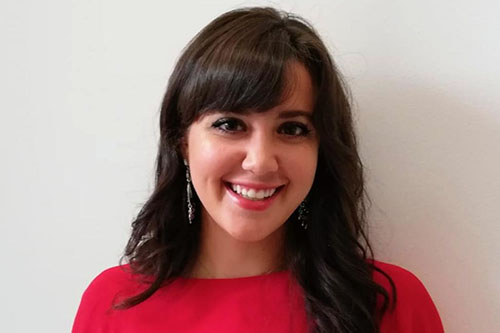Chiara Astore

Programme: BSc Management
Graduation year: 2020
What do you do now? What do you enjoy about what you do now?
I am currently on the MSc in Energy, Trade and Finance at the Business School (formerly Cass). In this course, we thoroughly explore the energy sector from coal, renewables, oil, natural gas to nuclear, and we carefully assess its challenges and what the future will look like.
Being one of the most polluting sectors, a lot of attention is paid to climate goals, and I find it fascinating how decarbonization plays a key role in establishing new targets and ambitions.
Why did you choose to study the Climate Change and Its Impact on the World Economy module?
I have always viewed business from the perspective of its impact on society. In my free time, I enjoy exploring contemporary issues through the art of photojournalism, and I came across a photo by Wally Skalij of a Californian wildfire in 2018.
The BSc in Management gave me a comprehensive overview of business and its challenges, and I wanted to know more about the key facts about climate change and its impact on the overall economy, what really is climate justice, and how politics and corporate strategies interplay in this very complex environment.
What does sustainability in business mean?
What I have learned through this module is that sustainability must not be seen as purely a matter of environment. Climate change is about society and its issues, and how important it is to have a healthy environment in order to guarantee intergenerational fairness. Being a sustainable business means reducing the social cost of its products and services.
A business should disclose transparently its carbon footprint and aim to reduce it quickly, thus aligning its strategy with national and supranational policies to keep temperature rises below the 1.5C degrees compared to pre-industrial levels.
A sustainable business leads the way, rejects greenwashing practices, fosters competitiveness to reduce new technology costs and encourages behavioural change.
What was your favourite part of the module?
My favourite part of the module was finding out about how corporations should adapt its strategies to climate goals. It was interesting to learn about the three different strategies in relation to carbon management, such as CO2 compensation, reduction and carbon independence, and what the measures to manage emissions were.
Carbon pricing and emissions trading mechanisms were my favourite topics, and I have loved studying their application further in my current studies.
What was the most challenging or surprising part of the module?
This module taught me how to ask myself the right questions rather than finding pre-packed answers, and Professor Bobby Banerjee has always encouraged us to think critically. It was therefore challenging (but amazing!) to construct my own perspective with the support of data to back up my thoughts with.
Throughout the module, we were provided with invaluable readings such as those from the IPCC, and we often had guest speakers talking about their fields of action. I was surprised by the data we were looking at such as per capita and country’s share of global emissions, uneven distribution of climate impacts, and forecasts by scenario and policies.
It was fundamental for me to understand these figures, as communication on climate matters is complicated and it must be simplified in order to reach societal sensibilization.
What impact do you feel the module has had on you personally and professionally? Has your perspective on business changed?
I can honestly say that this module has changed my life. For example, from a personal perspective, I have reduced my food waste, plastic use, meat and dairy food intake by using new recipes (“More plants, less waste” by Max La Manna is my new bible!).
From a professional side, it is now very hard for me not to be critical of what I buy and where I buy it from. I was shocked when I found out about all the greenwashing practices employed by businesses, and this module has had an impact on my consumer behaviour, as well as the way I look at what is claimed to be a “sustainable” business.
What are the developments in sustainable business practices you’re most looking forward to or most interested by?
I am now fully immersed in the energy field, and I am very interested in the decarbonisation of the power sector. It is very intriguing to follow the challenges of the integration of renewables in the network: it is always a question of balancing supply and demand, while fairly pricing the service and allowing for the evolution of new technologies such as battery storage and smart grids.
Outside this topic, I am looking forward to seeing developments in the food industry and their packaging practices, as well as how the fast-delivery majors are planning to effectively downsize their carbon footprint.
What key piece of advice would you give to future students who are thinking about taking this module/a career in sustainable business?
I strongly recommend students take this module. Embedding sustainability in business is not a negative disruption but a needed revolution. It is an important topic to consider as climate change is a rising concern for society and businesses, since it brings operational and financial risks as well as opportunities.
My key advice would be to think critically about the information you are given and make the most out of recommended readings and class discussions. Shape your own mindset based on statistically significant data. Do not be a victim of short-termism and choose your career based on your causes and passions. Inform yourself, question what is taken for granted and fight for transparency.
Take a look at our current profiles and find out more about our successful alumni.